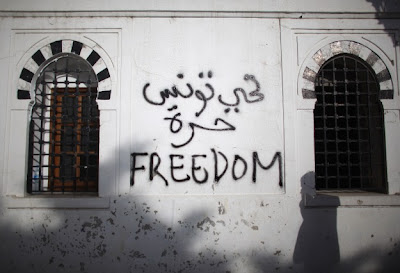Power Vacuum in the Middle East: The Case for Tunisia
When we look at the situation in Tunis, we will find that former President Zine el-‘Abdin Ben ‘Ali made sure there is no opposition to his regime during his reign. He based his rule on what is called “performance legitimacy”. His grandiose rhetoric as the protector of the nation and the relative economic success were not enough justification to govern for 23 years. Thus, once the economic gains faded and large masses became aware and organized the regime went down. The police state and the ruling party in Tunisia were in control of every medium possible, especially the media that can be turned against the system. Several opposition and Islamic group leaders were expelled to Paris and London. In a nut shell, the Tunisian society has been facing 23 years of oppression, crushing political activism, and control of media and internet. All these tyrannical actions pushed any remaining political parties and opposition groups, which could fill in the political vacuum, to remain underground or play with the rules laid by Ben ‘Ali’s regime.
Since most, if not all, opposition parties out of service and weak; Tunisians were only left with powerful organized trade and labors unions. Fortunately for Tunisians, these unions were one of the things adopted from the French colonialism. The unions played a vital role in the lives of many Tunisian workers. It helped raise awareness among its members and led the strikes in the early days of the revolution. Another positive aspect in the Tunisian society was the quality of education and the economic success. This helped generate a well educated middle class. Together with the various syndicates worked side by side during the month long revolt to oust Ben ‘Ali. Thus, if it wasn’t for an educated middle class backed by powerful trade unions, Tunisians won’t have been able to stand against the state terror, economic distress, political stagnation, corruption, and a controlled iron fest on media and internet.

The protesters’ demands were clear. The whole regime must fall, Ben ‘Ali isn’t enough. The departing prime minister acknowledged the people’s complaints saying “my resignation will provide a better atmosphere for the new era.” This will put pressure on the current government to take credible measures to bring stability to the country. That can happen only if they are seen to be serious about recognizing the people’s demands and implementing needed reforms.

